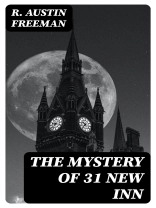In ‘The Mystery of 31 New Inn, ‘ R. Austin Freeman masterfully intertwines a complex narrative of crime and deduction, set against the backdrop of early 20th-century England. This work, notable for its pioneering use of the ‘inverted detective story’ format, transports readers to a world where a polymath detective, Dr. John Thorndyke, unraveling a seemingly unsolvable murder, relies on empirical evidence and scientific reasoning. Freeman’s prose is both engaging and richly detailed, reflecting the burgeoning interest in forensic science during the Victorian and Edwardian eras, while his characters navigate the intricacies of human behavior and moral ambiguity. R. Austin Freeman, a contemporary of Arthur Conan Doyle, was a former hospital intern and a skilled medical practitioner whose background imbued his detective fiction with realism and scientific authenticity. His experiences in the medical field heavily influenced his portrayal of crime investigation, as he sought to elevate the genre by incorporating forensic methodology and rational analysis. Freeman’s distinctive style and focus on the logical resolution of mysteries position him as a foundational figure in the development of detective fiction. Readers seeking an intellectually stimulating and engaging mystery will find ‘The Mystery of 31 New Inn’ to be an essential addition to their collection. Not only does it offer an intricate puzzle that demands attention and contemplation, but it also provides a fascinating glimpse into the intersection of science and crime during a pivotal era. Immerse yourself in Freeman’s world and experience the elegance of a narrative that shaped the future of detective literature.
Sobre el autor
R. Austin Freeman (1862-1943) was a prominent British writer primarily known for his detective stories featuring the medico-legal forensic investigator Dr. John Thorndyke. He had not just a flair for crafting engaging mysteries but also a professional background in medicine that lent credence to his work. Freeman graduated from the Middlesex Hospital Medical School and became a colonial surgeon before turning to writing after his return to England. His character Thorndyke, introduced in his first novel ‘The Red Thumb Mark’ (1907), embodies Freeman’s medical expertise and is distinguished by his scientific approach to crime solving, a significant innovation in the genre. The novel ‘The Mystery of 31 New Inn’ stands testament to Freeman’s skillful interweaving of medicine and mystery, a hallmark of his literary style. Freeman’s writing was known for its well-constructed plots, attention to detail, and the use of the ‘inverted detective story’ format, wherein the audience witnesses the crime before following the detective’s investigation. His narratives were pioneering for their time, influencing the evolution of forensic science in fiction. Beyond the Thorndyke series, Freeman authored several other mystery novels, short stories, and even historical fiction, showcasing his versatility as an author. His contribution to the detective genre continues to be recognized by literary scholars and mystery aficionados alike.












